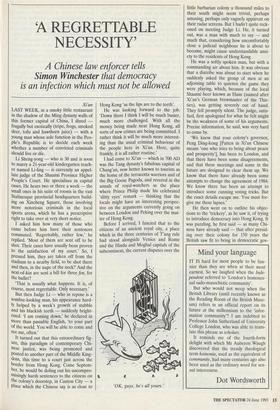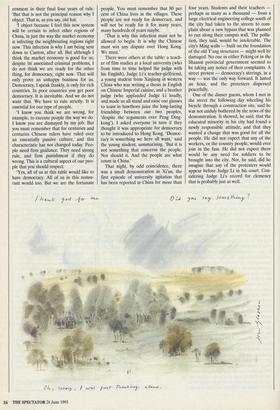A REGRETTABLE NECESSITY'
is an infection which must not be allowed
Xi'an LAST WEEK, in a smoky little restaurant in the shadow of the Ming dynasty walls of this former capital of China, I dined frugally but exotically (tripe, frogs, smoked deer, tofu and hawthorn juice) — with a young man whose sole function in the Peo- ple's Republic is to decide each week whether a number of convicted criminals should live or die.
Li Sheng-yong — who is 30 and is soon to many a 21-year-old kindergarten teach- er named Li-ling — is currently an appel- late judge of the Shaanxi Province Higher People's Court. He specialises in capital cases. He hears two or three a week — the small ones in his suite of rooms in the vast Stalinesque provincial headquarters build- ing on Xincheng Square, those involving more notorious criminals in the local sports arena, which he has a prescriptive right to take over at very short notice.
I asked him how many of those who came before him have their sentences commuted. 'Regrettably, rather few,' he replied. 'Most of them are sent off to be shot. Their cases have usually been proven to the satisfaction of my court.' So, I pressed him, they are taken off from the stadium to a nearby field, to be shot there and then, in the nape of the neck? And the next-of-kin are sent a bill for three fen, for the bullet?
`That is usually what happens. It is, of course, most regrettable. Only necessary.'
But then Judge Li — who in repose is a sombre-looking man, his appearance hard- ly helped by a week's growth of stubble and his blackish teeth — suddenly bright- ened. am coming down,' he declared in more than passable English, 'to your part of the world. You will be able to come and see me, often.'
It turned out that this extraordinary fig- ure, this paradigm of contemporary Chi- nese justice, was being promoted and Posted to another part of the Middle King- dom, this time to a court just across the border from Hong Kong. Come Septem- ber, he would be doling out his uncompro- misingly harsh sentences to the citizens on the colony's doorstep, in Canton City — a place which the Chinese say is as close to Hong Kong 'as the lips are to the teeth'.
He was looking forward to the job. `Down there I think I will be much busier, much more challenged. With all the money being made near Hong Kong, all sorts of new crimes are being committed. I rather think it will be much more interest- ing than the usual criminal behaviour of the people here in Xi'an. Here, quite frankly, it is all rather routine.'
I had come to )(fan — which in 700 AD was the Tang dynasty's fabulous capital of Chang'an, now better known to tourists as the home of the terracotta warriors and of the Big Goose Pagoda, and revered in the annals of royal-watchers as the place where Prince Philip made his celebrated `slitty eyes' remark — thinking that the locals might have an interesting perspec- tive on the arguments currently going on between London and Peking over the mat- ter of Hong Kong.
Before I arrived, I fancied that to the citizens of an ancient royal city, a place which in the three centuries of rang rule had stood alongside Venice and Rome and the Hindu and Moghul capitals of the subcontinent, the current disputes over the `OK, guys, he's all yours.' little barbarian colony a thousand miles to their south might seem trivial, perhaps amusing, perhaps only vaguely apparent on their radar screens. But I hadn't quite reck- oned on meeting Judge Li. He, it turned out, was a man with much to say — and much that, considering how uncomfortably close a judicial neighbour he is about to become, might cause understandable anxi- ety to the residents of Hong Kong He was a softly spoken man, but with a commanding air about him. It was obvious that a diatribe was about to start when he suddenly asked the group of men at an adjoining table to quieten the game they were playing, which, because of the local Shaanxi beer known as Hans (named after Xi'an's German brewmaster of the Thir- ties), was getting severely out of hand. They fell promptly silent. The judge, satis- fied, first apologised for what he felt might be the weakness of some of his arguments. Precise information, he said, was very hard to come by.
`We know that your colony's governor, Peng Ding-kong [Patten in Xi'an Chinese means 'one who tries to bring about peace and prosperity'], has been to London, and that there have been some disagreements, and that these meetings and some in the future are designed to clear them up. We know that there have already been some attempts to change the agreement of 1984. We know there has been an attempt to introduce some cunning voting tricks. But the exact details escape me. You must for- give me these lapses.'
He then went on to outline his objec- tions to the 'trickery', as he saw it, of trying to introduce democracy into Hong Kong. It was puzzling, he first said — as many Chi- nese have already said — that after presid- ing over their colony for 150 years the British saw fit to bring in democratic gov- ernment in their final four years of rule. `But that is not the principal reason why I object. That is, as you say, old hat.
`I object because I feel this new system will be certain to infect other regions of China, in just the way the market economy is infecting the neighbouring regions right now. This infection is why I am being sent down to Canton, after all. But although I think the market economy is good for us, despite its associated criminal problems, I do not think we are ready for the other thing, for democracy, right now. That will only prove an unhappy business for us. Democracy, I speak frankly, is only for rich countries. In poor countries you get poor democracy. It is inevitable. And we do not want that. We have to rule strictly. It is essential for our type of people.
`I know you think we are wrong, for example, to execute people the way we do. I know you are dismayed by my job. But you must remember that for centuries and centuries Chinese rulers have ruled over an essentially passive culture, and this characteristic has not changed today. Peo- ple need firm guidance. They need strong rule, and firm punishment if they do wrong. This is a cultural aspect of our peo- ple that you should respect.
`Yes, all of us at this table would like to have democracy. All of us in this restau- rant would too. But we are the fortunate people. You must remember that 80 per cent of China lives in the villages. These people are not ready for democracy, and will not be ready for it for many years, many hundreds of years maybe.
`That is why this infection must not be allowed to begin. It is why the Chinese must win any dispute over Hong Kong. We must.'
There were others at the table: a teach- er of film studies at a local university (who from time to time helped the judge with his English), Judge Li's teacher-girlfriend, a young student from Xinjiang in western China who was writing a thesis in English on Chinese Imperial cuisine, and a brother judge (who applauded Judge Li loudly, and made us all stand and raise our glasses to toast in hawthorn juice the long-lasting friendship between our two peoples, `despite the arguments over Peng Ding- kong'). I asked everyone in turn if they thought it was appropriate for democracy to be introduced to Hong Kong. 'Democ- racy is something we here all want,' said the young student, summarising. 'But it is not something that concerns the people. Nor should it. And the people are what count in China.'
That night, by odd coincidence, there was a small demonstration in Xi' an, the first episode of university agitation that has been reported in China for more than four years. Students and their teachers perhaps as many as a thousand — from a large electrical engineering college south of the city had taken to the streets to com- plain about a new bypass that was planned to run along their campus wall. The pollu- tion, they said, would be intolerable. The city's Ming walls — built on the foundation of the old Tang structures — might well be damaged. No one in either Peking or in the Shaanxi provincial government seemed to be taking any notice of their complaints. A street protest — democracy's stirrings, in a way — was the only way forward. It lasted an hour, and the protesters dispersed peacefully.
One of the dinner guests, whom I met in the street the following day wheeling his bicycle through a construction site, said he was not unduly bothered by the news of the demonstration. It showed, he said, that the educated minority in his city had found a newly responsible attitude, and that they wanted a change that was good for all the people. He did not expect that any of the workers, or the country people, would ever join in the fuss. He did not expect there would be any need for soldiers to be brought into the city. Nor, he said, did he imagine that any of the protesters would appear before Judge Li in his court. Con- sidering Judge Li's record for clemency that is probably just as well.



















































 Previous page
Previous page